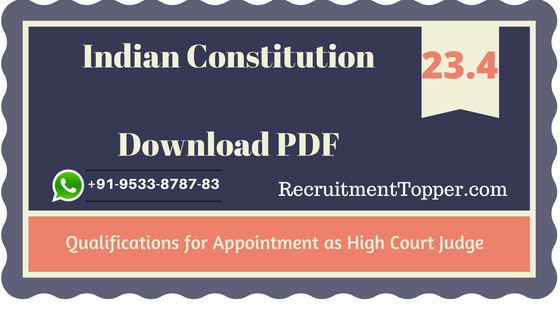Qualifications for Appointment as High Court Judge
Contents
The qualifications laid down in the Constitution for being eligible for appointment as a Judge of the High Court are that—
(a) he must be a citizen of India, not being over . 62 years; and must have
(b) (i) held for at least 10 years a judicial office in the territory of India; or
(ii) been for at least 10 years an advocate of a High Court or of two or more such Courts in succession [Art. 217(2)].
Independence of the Judges
As in the case of the Judges of the Supreme Court, the Constitution Independence of seeks to maintain the independence of the Judges of the Judges. the High Courts by a number of provisions:
(a) By laying down that a Judge of the High Court shall not be removed, except in the manner provided for the removal of a Judge of the Supreme Court, that is, upon an address of each House of Parliament (passed by a special majority [Art. 218];
(b) By providing that the expenditure in respect of the salaries and
allowances of the Judges shall be charged on the Consolidated Fund of the State [Art. 202(3)(d)]; –
(c) By specifying in the Constitution the salaries payable to the Judges and providing that the allowances of a Judge or his rights in respect of absence or pension shall not be varied by Parliament to his disadvantage after his appointment [Art. 221], except under a Proclamation of Financial Emergency [Art. 360(4)(b)];
(d) By laying down that after retirement a permanent Judge of High Court shall not plead or act in a Court or before any authority in India, except the Supreme Court and a High Court other than the High Court in which he had held his office [Art. 220].
Control of the Union over High Courts.
As Sir Alladi Krishnaswami explained in the Constituent Assembly,6 while ensuring the independence of the Judiciary, the Constitution placed the High Courts under the control of the Union in certain important matters, in order to keep them outside the range of ‘provincial politics’. Thus, even though the High Court stands at the head of the State Judiciary, it is not so sharply separated from the federal Government as the highest Court of an American State (called the State Supreme Court) is. The control of the Union over a High Court in India is exercised in the following matters:
(a) Appointment [Art. 217], transfer from one High Court to another [Art. 222] and removal [Art. 217(1), Prov. (b)], and determination of dispute as to age [Art. 217(3)], of judges of High Courts.
More Resources
;

Leave a Reply